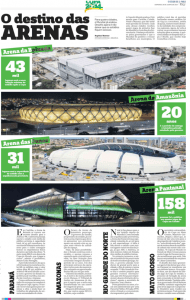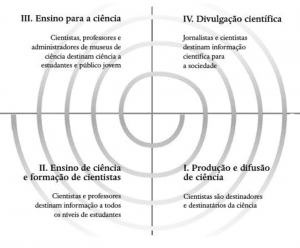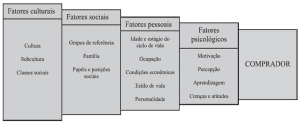ALMEIDA, Antônio Afonsinaldo Saldanha de [1]
ALMEIDA, Antônio Afonsinaldo Saldanha de. The 21st century: a return to the Caves-social networks to the myth of the cave today. Revista Científica Multidisciplinar Núcleo do Conhecimento. 03 year, Ed. 05, vol. 06, pp. 48-69, may 2018. ISSN:2448-0959
Summary
This article brings a matter involving some of the mainstream media today that are social networks and the Internet, and your likeness to the "Myth of the cave" t[2]he platonic philosophy. As the author tells us of people who lived in a cave and for them that reality was the only one that existed. This digital universe that every day attracts and conquest new followers to your use. Users delighted with so many possibilities that these devices for your life, can be caught to this virtual reality as if it were the only reality there is to live in a darkness as if you were inside a cave. So the aim of this work is to awaken the society attention to these new social vices and create a point of inquiry about the behavior on the use of social networks and the internet.
Keywords: Philosophy, social networks, social networks.
Introduction
This work has as object of study the "Myth of the cave" of Plato a[3]pplied to social networks. In the 21st century generation y is being influenced by new social trends which have the internet and social networks as only tools to access all kinds of information in a single place or device. Through this knowledge, the user often develops a kind of lock and not wanting to get out of your comfort zone designed by himself.
This new tool allows the user the possibility to solve almost all your daily obligations through access to the internet as well as maintain its social relations through existing social networks, making it possible to connect with people close or far apart which makes them increasingly dependent on technology.
This trend brings a conception of a return to the allegory of the myth of the cave, that would be a group of people who develop your own world from their own experiences of form would have thought totally different from existing reality, because it occurs users who develop an unreal world in your social environment, where the use of social networks and the internet would be your only source of information and knowledge of the truth to believe.
These users have a habit of making groups of conversations or chats about various subjects are: TV shows, football or Religion. These types of subject the Captivate and hold the attention to every posting, as matters of general interest of the group, thus, people spend a lot of time talking and sharing such information in a place very cozy collapsed and their homes .
It is noticed that currently people feel more comfortable in possession of your electronic devices, what keeps them trapped in their rooms or in a place of the House where you feel very comfortable, completely to the smartphone, tablet or laptop. This image refers to an idea put forward by Plato in your work entitled "the Republic". In your book VII, the philosopher presents us an allegor[4]y of the cave which is known as the "Myth of the cave".
This study comes to show that the postmodern society is slowly, cloaked form, living in a cave without knowing the "truth", at the mercy of your unconsciousness, being in darkness due to the overuse of social networks or the internet.
The rationale for this approach is intended to show that the new trends of getting stuck to virtual reality which often will not allow realizing that your world is idealized and surreal. The encounter with the real world or social changes, it is in a way that does not develop a critical sense about the society in which he lives.
The problem is precisely that people keep stuck to their customs that were offline and online [5]has now become the livi[6]ng in order to avoid physical contact with another person and wanting only the virtual contact even though the same lunch table , dinner or other environment with friends.
With this line of thinking, the goal put into question is to show the readers some harm to your overuse of social networking that came due to technological advancement, that every day is directly inserted into social behavior, causing the feeling that everything is unreal in the world which does not belong.
However, people who are in these conditions will have on the other deletion behavior for recovery of virtual contact and at the same time will lock in your ideal world or in your comfort zone accommodation
1. Myth of the cave
Plato in your work the Republic (1999), tells us that the cave had people who have been trapped since your childhood with eyes fixed to a wall, where it saw several shadows of events outside the cave and to contemplate such images, they sought to interpret reality through them, because it was the only source of information we had. They interpreted the images formed on the wall and discuss among themselves and drew their own conclusions about each image view.
At one point, one of them managed to release from prison and get out of the cave, which had the glare of your vision because of the contact with the Sun's rays, and when he got to see the world when your around realized that the real images were different from those he saw in the cave.
So has acquired the knowledge of the true origins of the shadows that I used to see, however such representations were not the way he thought, namely, gradually realizing that the world was totally different from what they create in your imagination and all years of experiences have collapsed because it had full knowledge of the truth on the real world out there.
This refugee couldn't help himself with so much information and decided to share the truth he had discovered with his colleagues. To return to the cave he began to tell what I had experienced, to the extent that his teammates were listening to the events he had witnessed the group that there was listened and was amazed with the information reported.
The refugee believed he was doing the right thing, that is, show the truth and trying to open the eyes of your colleagues to a reality outside the cave. Listeners faced with so much information, they would not believe in all of you just listen, soon concluded that the refugee would be completely insane and did not think twice before killing him.
1.1. Myth of the cave and your contextualization with social networks
The Allegory of Plato invites the reader to notice their attitudes to the world when your around, taking then the reader to review and possibly pass to see reality in a different way, in a way that still had not noticed due to the rush of modern life as : work, study, family. He can't take advantage of every moment of your day, thus giving the impression that this is a return to the cave that was mentioned in the myth of Plato.
To resort to still use of social networks and the internet to solve or satisfy your need, realize that there were social changes that occur every minute, can develop in your mind a world completely different from reality which is inserted, because Internet users when disconnects realizes that the reality was not the way he thought, it is clear that the developed world in your imagination really is a world for the same ideal.
From this knowledge, the reader will have a larger attention to your social profile as well as before to their social links, i.e. family, groups of friends who won over time, but these achievements were not always a bed of roses, personal issues or identify any divergent thought and due to disappointments the user develops barriers before future social groups and their members.
This user can have multiple profiles in different social networks or on the same network that is already inserted, to suit every purpose you want or group you want to be inserted, so will living a fictional reality. Afraid of being rejected, your content cannot be shared, so it creates to your own network with the intention or goal to remain in a comfort zone, which is classified in this work as a prison.
Following this same line of reasoning, one could say that many users of social networks or the internet for being excited about the subject or with the shared content and being afraid that someone discover your virtual intimacy, their conversations or who is typing, immediately seek a private place, a safe place and hidden so nobody interrupt or disturb your interaction. This attitude, often spontaneous, with this process shows us that there is a search or return the caves today.
The social network in recent years has gained a good share of importance due to the ease of communication with an individual or several (users) at the same time using a single tool. Having no age limit and no time to use something captivating the user begins to devote a good part of your time. No limit and discipline the user won't want it to end so soon his connections. Is it a social network?
What is social networking? We know that this terminology "social network" has become very popular nowadays due to the popularity of Facebook and the internet. Tend the idea that social networks would be something new and innovative, I Martha Gabriel (2010, p. 193) in your Marketing work in the Digital Age says: The "social networks have been around for at least 3000 years, when men sat around a campfire to chat about matters of common interest ".
In the course of this text will be possible to understand what really is a Social Network and your story, as well as decipher your difference with digital media and how your relationship with the Myth of the cave. However, if you ask the average person who has never had contact with the internet and with the social networks and we asked for what is a "network", she would answer it would be a tangle of lines, basically this idea also applies to social networks. Because it's been a long time since the Leonhar[7]d Euler has sought to understand what they would be as well as your structure, so your concept itself comes from graph theory, that would be a set of nodes interconnected and connected forming a network, this theory is being represented in the following figure:
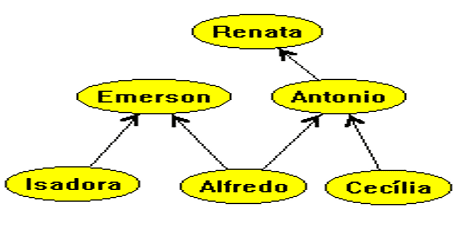
On the basis of this concept can be said that the social[…] network is "a set of participants, uniting ideas and resources around shared values and interests" (MATELETO, 2001, p. 72).
This is one of the clearer definitions and apply in the digital age. With this definition we understand that these periods (users) are interconnected with each other due to the social links that were formed by the family members, friends, work. This friend also has other mutual friends or not, the same has your own sharing group and so a day before.
The information will be passed on and before you know it have already beco[8]me viral, this way, the common interests make hand individualism go gradually being forgotten or experienced.
So "networked individualism is a social pattern, not an accumulation of isolated individuals. What happens is that individuals ride their networks, online and offline, based on their interests, values, affinities and projects "(CASTELLS, 2003, p. 109), in this way the author strengthens the idea that social groups both in the offline environment as the online, both mix, they are grouped according to common interests, but a group does not necessarily need that the other exists to pass there or vice versa, a group does not depend on the existence of the other.
Even the online digital environment today is more popularized due to the possibility to talk with anyone and anywhere, because there is no need for another person be present, so in this environment users can take advantage of all the gaps of your busy day to talk to your friends in the digital environment.
In the case of the offline environment is essential for the presence of another person so that they can both talk, it may be that for some users would be a waste of time. However, the affinity of users with social networks because of ease of being connected to each other is that grows increasingly these platforms.
The first step is the creation of a profile with your real name or fictitious, which makes it unique in the digital society. Uses various means to connect with your friends via a smartphone, laptop, computer and other devices.
The myth of the cave with the social network comes from the knowledge of the prisoners in the cave that they were arguing among themselves about certain shadows that were reproduced on the cave wall.
Fábio Duarte [9]goes beyond saying that:
"Social Network is a social structure made up of persons or organisations, connected by one or more types of relationships, who share common values and goals[…]. Networks are not therefore just another form of structure, but almost a structure, not in the sense that part of your strength is the ability to do and undo quickly "(2008, p. 156).
Philosophical anthropology presents the man is a social being, asserts that for your nature, he will always have the need to live or be in a group, whether it be family, friends or individuals who are in your habitat. Approaching one of the other according to each experience in your social environment to be inserted.
Second Baptist Mondim (1980, p. 154): "man is a sociable, because it has the propensity to live together with others and communicate with them, make them participants of their own experiences and their own desires, mingle with them the same emotions and the same goods ".
It can be said that since the dawn of the human groups have communicated with each other and continues to the present day. Throughout history, individuals gradually if grouping according to their needs, objectives or affinities.
In this way, these groups were strengthening their social links and over time became communities, towns and cities, increasing the number of groups, many times to solve problems that arose every historical period, due to differences of thought or the need of these adjustments serve to remind and reinforce their common goals.
The maturation of these groups came about due to their learning, from these individual experiences that were shared with each other. With that the unification of these experiences supports overcoming their differences and its resolutions cause reflection in any social context.
Centuries have passed and as humanity was evolving your way to communicate, could divide this process into four parts, as Marcelo Teixeira [10](2012, p. 24):
"society is communicated-if 1 interpersonal communication, characterized by two-way exchange between two or more people within a group; the second establishes itself of "one to many", in which each individual sends a message only to a limited group of people; the third is the model of mass communication, in which, thanks to the use of specific technologies of mediation, a single message is addressed to a mass of people, and the fourth is the model of contemporary society, shaped by the ability of world globalization processes along with the networking between the mass media and interpersonal media ".
In this evolution, the concept of media or social networking was not clear, although there were many very popular networks like Orkut, Myspace and others that preceded the Facebook.
Through this network began to understand what really would be the social networking concept, because bringing in your platform news that had not yet been explored, so this something new took untold proportions without territorial limit due to your popularity.
They are present in all social layers that use them as your primary means of communication. As users are getting acquainted and using social networking is gaining your reliability between people who go growing in number every minute, due to new supporters who were being achieved gradually, however the concept of exclusion no user enforces the social part of this digital world, where a good part of their family, friends and the Working Group were already inserted.
"In Brazil, 90% of young people from 9 to 17 years have at a social network profile. With 69%, Facebook is more accessible for them daily, according to the ICT research Brazil Kids Online. The survey shows that children of six years are already beginning to create profiles on the Web. The primary means of access is the smartphone, with growth of 29% compared to last year. The study also shows that 17% of young people use the Internet café to connect to the internet [11]".
Based on this research shows that 90% of young people have at least one profile in a social network that exist in the world, but people are taking advantage of this social movement as well as companies with their profiles with the aim of narrowing your related operating with their consumers and build relationships with your potential buyers.
The most common among the users worldwide would be Twitter, Facebook, WhatsApp among others, because they are responsible for retaining the attention of your users taking a good part of your time. Because they have a facility to bring people together, regardless of where they are, give possibility to create conversation groups according to socio-cultural preferences, developing another world, virtual.
With these creations of groups spontaneously between users regardless of interest, we understand this social trend present in the world and in all social strata, mainly by the popularity of smartphones and the internet generating interactivity and content sharing.
Success occurs due to the level of reliability among users because they have the same attitudes and affinity of conversation, developing a common language between them, not creating rules, time and no limits of dialogue as we can see that the boundaries of the networks are not bounds of separation but boundaries of identity. It's not a physical limit, but a limit of expectations, of trust and loyalty, which is permanently maintained and renegotiated the communications networks "(DUARTE, 2008, p. 10.).
With this statement we can define the conversation groups present in social networks have as habit to a constant renewal of the contract of relationships or natural affinity between users and their links are increasingly strengthened.
However over time the social networks were suffering adaptations due to the particularities and requirements of each Member. Without these improvements would not be possible the permanence of certain networks.
2. Development of social networks and your story.
As the social networks were becoming more popular, new needs have emerged which are of improvement or development, even if it is a trend of the moment and something new, because in a short space of time there was a considerable change, taking into account the expectations of its users.
So far we have three periods that mark the improvement of social networks, divided into 1.0, 2.0 and 3.0. This natural process to ensure the permanence of its members, avoiding your migration to other platforms.
Their evolution was not only motivated by the usual aspect, but also to follow the innovations of the internet.
As we can see below:
2.1. NET 1.0
This network features groups that communicate with each other simultaneously. It has for example[12] ICQ [13]and MSN regarded as two of the first social networks that used the internet to communicate.
2.2. NET 2.0
The change of 1.0 to 2.0 paradigm came about due to the possibility of sharing and exchange of files and images, which are marked by the creation of Orkut, MySpace and Linkedin, they provided its users, entertainment, creating a group of contacts and professional profile.
2.3. NET 3.0
What breaks the paradigm of the internet is mainly the concept of social networks due to the creation of Facebook, allowing integration with all networks, this platform has brought much more than they had in mind.
On the same platform can play games, share videos, pictures in interaction with people from all over the world. So managed to unite in one place, share comments, forums, chats, collective communication.
But all this only became a success due to the popularization of the Internet in all social strata, i.e. with the easy acquisition of smartphones by the population through the influence of tax breaks on electronic products[14].
Not only does this fact facilitated the growth of social networks, the plots of greatest importance are the promotions that offer operators the use of these free platforms that every day grows.
3. Similarities and differences between media and social networks
The rapid evolution of social media and social networks hindered your differentiation as both have many similarities in common, with that we don't really know the difference between them. Although that can be classified as synonyms, media comes from the Latin term that means means applying the theme would be Social environment then we can define that Social media would be a means of communication where anyone can communicate, having the possibility of have fans coming up so a social network, due to approach by marriage. As the author Recuero (2010) stated in your work:
"Network and social media are different things. Social networks are metaphors for the social groups. Already the "social media" (without entering here on merit of the term), is a set of dynamic social network. Explain: are the dynamics of content creation, dissemination of information and exchanges within the social groups established in online platforms (such as social networking sites) that characterize what we call social media today. Are the actions that emerge within social networks, by the interaction between people, based on the social capital built and realized that they're going to start disseminating information moves, building and sharing content, mobilization and social action ".
In summary the social network would be "relationship site, social networking sites, which are sites where users are connected, that is, the groups that are the networks that we can cite as twitter, forums, chat rooms so users of interne seek the information they need at the time, through these they begin to exchange information among themselves, this is social network.
Already social media "new media, new media, that are Facebook, MySpace, Blogger, WordPress, Youtube, Sonic, are known as platforms which we use to communicate. If all of them are media which would really be the difference? We know that in practice each has its merits, as we can see has in four types of the following models:
3.1. Facebook
Although it is classified as a social network for its members, she is a social media that allows the user, with your registration, which we call your profile, personal or business, creating a network of groups of friends.
With this active profile, the user has the right to share or post records of their best moments experienced in your day-to-day, because being available these status are communicated to other users to[15] likese it happens also on own line of time[16] on the shares of the other persons who were accepted in the social group.
When we refer to a profile of a company, your posts are intended to promote a brand or product to strengthen your trade links with the consuming public.
"The initial focus of Facebook was to create a network of contacts in a crucial moment in the life of a young university student: the time when this gets out of school and going to College, what, in the United States, almost always represents a change of city and a new spectrum of r social lessons from "(RECUERO, 2009, p. 169).
3.2. MySpace
The particularity of this platform was by the spread of new musical groups and his compositions. To arise her popularly, developed characteristic of an employment agency or professional opportunities, for this reason she is gaining adherents, as the new artists looking for a label to show your talent.
"MySpace had the permit a much greater degree of personalization that Facebook Such d[…]ifferential was quickly appropriated by users, to create communities for customization of profiles, with tips and information" (RECUERO, 2009, p. 172.).
3.3. LinkedIn
Being a network that focuses on the job profiles aiming at business or hiring of new professionals, your user through a profile based on their qualifications or work experience, develop a resume online.
This network gave its members the opportunity to create links with professionals in your area or other, as well as the profiles of the companies registered. So companies have access to data, people of each user.
3.4. YouTube
In this network the users share videos with each other, not just for your group of friends, but also for the world. These publications take incalculable proportions because of the night to day a user may become very popular. Youtube became popular when it was bought by Google in 2006 was regarded By time magazine, the best invention of the year for 2006[17].
These were some of the main platforms or digital media that exist in the virtual world as it is through them that its users share the key moments of their lives generating a relationship and good visibility.
Contact these people or users had made to create a very strong charm imprisoning their users in a way that does not wish to ever come out of the interaction, this same behavior happens with who is already inserted in the network and each like, comment or sharing will automatically stay stronger.
4. The charm to the prison in the digital world
Due to social networks to become one of the major forms of information, currently, the spell developed by interaction provides the user quickly and participatory, contacts with other users. By being easy to use and to create a profile, user: become a "digital person" the way you want, so Giardelli (2011, p. 60) says that "social netwo[digitais]rks have become a vast space where millions of people feel comfortable to be who they really are ".
For ease of creating profiles with understatement, i.e. people with features or personalities different than they really are. Due to the popularization of the internet, according to research conducted in 2015 by the Ministry of communications we can see why people access the internet:
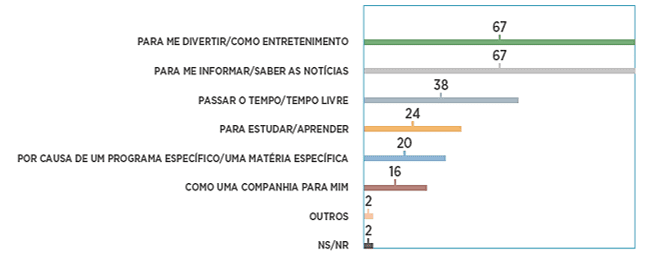
It is clear that a good portion of these users search fun, and information, with this longing is based on social network, because it meets all these needs. Having it all in one place, as well as your charm grows slowly you can see some changes with respect to their attitudes or behaviors of these netizens that are characterised as a return to the cavern of Plato, although of cloaked form and little perceived, these caves, prisons will only be characterized as something physical (place), but also as the exaggerated use or compulsive on social network addiction of the digital age.
The same survey showed that there was a growth of 26% from one year to the next, due to increased procurement of smartphones and your use by brazilian population, thus having considerable growth each day via the mobile internet, because every minute we have new frequent users.
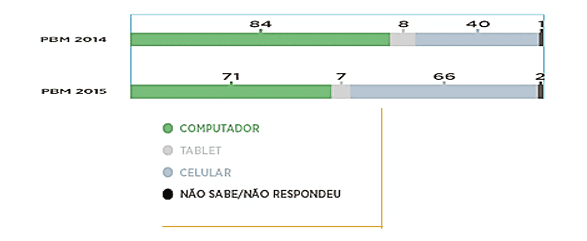
In Brazil, the Facebook still leads the Ranking followed WhatsApp, as networks that have the power to hold the attention of your users in their platforms. This is because the contents produced by the members themselves can interact in several social networks.
With this line of reasoning, it is possible to notice that people connected to one of the social networks mentioned earlier as well as WhatsApp, feel a greater need for attention within your scope. This is due to the large amount of members of the Group interacting at the same time in the chat[18].
At the time a member of the group in question comments your opinion, he needs the attention of readers so that you don't lose the thread (conversation), because every minute, another Member may initiate a new conversation coming up so another conteú of being mentioned among them.
Due to the various content that are posted or shared personal profiles for each user, each want the faster responding to others, this attitude can be constant and commonplace that develops some skills like typing fast and respond to messages, instant forms as Tapscott:
"They are accustomed to instant answers 24 hours a day, seven days a week. Video games give them instant feed back; Google answers your questions on nanos seconds. So, they assume that everyone else in the world will react too quickly. Each instant message should generate an instant answer "(2010, p. 115).
Often this user or read posts from your network or just do a quick read, because the larger your order is to pass as quickly as possible to other groups that have not yet been posted. This seems to be the idea, to be the first to share, not always seeking to know the origin of information, believing that this content that was posted and then shared by he would always be a true news.
Not having this, the user to relay false information as if they were truths, may contribute to the spread of negative content growth that has prejudiced, racist support base and encouraging violence. This attitude strengthens the fear.
This process to receive and pass on social networks content holds the user a longer time, because you will always have someone online to exchange information and the desire to be logged in to be informed of everything and everyone, and there is no need to leave home to achieve these goals.
With this mentality and behavior, one can deduce the creation of one of the main features of the subject, that would be inside the cave due to not want more out of your residence, because what you need is already on the social network.
A second feature: WhatsApp groups have as a rule the integration, because who is inserted and connected at the same time it has duty to interact with other members. If the Member does not interact, it may be taken from the administrator group. However this member having fear or fear of no longer belong to the group, knowing that your lack of interaction can lead to your output, will devote a large part of your time or you to this group.
This feeling of fear of exclusion can be classified as chains that imprison the minds of users of social networks to be fixed or hung up without your presence online, dedicating himself full time giving your opinion and sharing on the issues put into question by the other members.
With this change of attitude, the user can slowly develop a total dependence to social networks or to the internet, if used to believe only in the information posted in the online world as the only source of the truth of the facts.
In this context, many times your offline world is interconnected with the online world, because when something happens in offline and has not been posted, shared or disclosed in the social network this event will not be recognized as something occurred, that is, as If it never happened.
I can have as a practical example of this divergence between the two worlds in a situation where a member of Facebook to see your friends or the friends of your friends and awaken an interest in dating a girl or boy or on both sides Search soon consult the desired profile to find out if your status is not serious relationship, this applicant having access to this information to have as a reliable source and true.
Even if the other person started a relationship recently and haven't updated your status in your s[19]ocial network, is considered by the researcher and their mutual friends as if you were still single, that is, you could say that two members began dating and esq ueceram to update their profiles, then to the online world they remain without any bond.
As another consequence of this feeling of fear we have the situation where the user might develop a compulsive behavior by social networks or digital media, most of the time when he has a sense of anguish for not being connected or have the need to be connected all the time, he often leaves aside other important activities just to stay connected.
The network is now so the only thing important to him and the usual activities like school, work and others lose your due importance. The cause of this routine can result in your absence in the offline world directly affecting your social experience. As stated by Castellis (2005, p. 23): "the network society also manifests itself in the transformation of sociality. What we observe, it is not the disappearance of face-to-face interaction or to increase the isolation of the people in front of their computers.
This constant permanence in networks or on the internet can cause discomfort for the other people to your surroundings. Gradually the presents begin to question your connection time for many hours, this behavior can be frequent and commonplace. However this user in your mindset due to already be so used to spend hours online you don't even realize that this posture can be disturbing your offline social life, so having the need of this conduct before your overuse.
This behavior may leave some consequences in relation to the others that are included in your social environment which do not have the same behavior. Attitudes like: talk by preference have social networks and not giving the opportunity that this conversation is attendance; can I come to a tendency to isolation, because when you're using your smartphone doesn't like to be bothered, and if that happens they get irritated easily with another person due to the interruption or loss of your attention in chat, among others.
A striking feature of a user with exaggerated behavior, obsessed or addicted, it would be the same change your status multiple times to generate and share likes. At a high level this same guy happens to find that your smartphone is a part of your life because it feels like I'm missing something, thus creating the need to be with the machine everywhere. If your appliance will be leave without putting your hand in your pocket to confirm your absence in short intervals, but also may have the feeling that you're listening to the sound of ringing or vibrating even though with the appliance.
In the program Via Brazil one of the respondents confirms what we're saying: "I'm dreading when the phone drain or the internet breaks down, when I'm in the place where wifi won't start, I am in despair. My mom is uncomfortable telling you there's more attention to your dog "[20]. It is very difficult to diagnose such use as disease without a proper professional help, to know when this custom became a dependency or disturbance.
If the user wants to know if you have this tendency exist in internet free tests, these questions are easy to understand where the same shall be given the opportunity to perform one of these tests developed by the Delet[21]e. So you can get a sense of your level of use or can figure out if it really is harmful or has already become an addiction.
This addiction or addiction to the internet or social networks is based on four pillar[22]s that characterize an exaggerated use to hold the user in the darkness of the cave. They are most noticeable in three types of platform: chat, Games and social networking, because regular users have the same points in common when it comes to a stage of addiction or disturbance, that we will see below.
1-When the user leaves to do their usual activities commonplace to be connected;
2-When he introduce a behavior of anxiety, irritability or depression for not being connected;
3-in this case the user has in mind that always needs a longer time to remain connected, i.e. always defers your end of the connection;
4-when it starts to get a detachment from other people and looking for places that can support your isolation.
These are the principal axes that tell when doing several tests online to find out if it has a dependency on the use of social networks. It will be possible to verify that fit in most of them, it is better to seek a medical support because this dependence is harmful to your professional and personal life, being one of the prisons and a return to the cave due to your fixation on being connected. Coming back so the show "shadows" which create an unreal world, renouncing the real world, not giving the opportunity to get to know a different reality than the virtual world.
Certainly the greatest benefit that social networking brought to post-modern society, relying on the need to be in society, was the pleasure of interacting with other people, because this technology in the service of the human being narrowed and ties relatives, separated by time and distance, making this event as a pinnacle of internet, thanks to social networks, due to the simultaneous exchange of messages, images and videos.
So the increase of their users, creating the need of constantly reinventing and adapting to new trends of the contemporary world. Because your space in people's lives has increased significantly, breaking the paradigms of communication between people. The impact of this invention has changed the way I see life and what she represents, interfering directly in the behavior of people who have this interaction.
All change or social transformation brings untold evils or unknown dangers. No one knows for sure what will be in the future, the changes or the consequences that will cause in society, but the idea of the effects caused by the overuse of social networking is the personal disorder which influences the behavior of people who are in your surroundings.
Thus, the use of rational way brings many benefits, but it comes from the concept of privacy social network usage, can develop disorders that leave the user looking to experience increasingly connected making this act more important than be with your family or friends.
The use of social networks is influencing directly the social life, excluding life face-to-face and Conference also the difficulties that have personal ties and classroom. In this way, the families that are a model of society urgently require information about the addiction to social networks, is gradually changing the social structure will your and their bases.
It is possible to find people who share all of your life on social networks, this type of user can get to imagine that is a connected person, but if your friends do not have the same behavior to share your moments in the network, such as travel, restaurant among others, can be labeled as antisocial, because people don't leave their homes due to not having posted such events, concludes that doesn't have a social life.
Following this same idea of being connected by several hours a day because this custom or habit to live only for the digital world, whether through the cell phone, computer or tablet and wherever you are, at home, on the street, in school among others, since this experience of being online and less in the real world. Then he will devote the social networks in which it is inserted and can be totally dependent on the virtual world. In this way, we can conclude that is hooked into social networks due to continuous use that has the same resemblance of the prison of the allegory of the myth of Plato's Cave.
4.1. First feature: "Shadows"
The myth of the cave, the "Shadows" are the images that are perceived as the only truth. On social networks the "images" that are posted no matter where they are, are believed to be truths.
The publications are not always that much importance to social group, but creates in the mind a false idea that members will give importance to such posts, so the environment becomes a real world.
In this way, the user has the illusion of popularity on the net and follow the posts of the other members, post your profile also demand a reality based on the other, it's not your reality, that is, he lives in a dream world in the network giving a reference to the "mu ing of ideas "t[23]hat Plato wanted to spend on your float.
4.2. Second feature: "two worlds"
This feature is easier to understand, because I can tell by the method of observation, to mention the world of the senses "world of ideas", which are all the knowledge that we have through the senses.
This knowledge in the digital age will by creating unrealistic profiles to show a fictional reality to other members of the group in participating so that they will believe as if they were real, but also the status or posts will sustain this created world. A simple example of one of those "worlds of ideas" would be modified by the user photos using image editors programs so that everyone has a different idea of what it is, so the other will show such image will have a twisted idea of reality. The other person contemplates and at the same time gets stuck to this reality due to the creation of your perfect world, virtual. That would be the cave, because a World oblivious to the real.
The Real wor[24]ld, on the other hand, is activated when the user disconnects from the social networks and "get out of the cave", it makes you feel loneliness, grief, disappointment and your desire is to be reconnected as soon as possible to fill these voids. Due to the remoteness of real life to live in a world of mind, every time that is not connected to your all around realizes it has changed and is still living a reality from fiction.
4.3. Third and last feature: "Escape and Return to the cave"
For support of this fictional world in the online environment, there is a need to be connected 24 hours a day, so that excessive use can become a dependency of social networks, this being in the virtual environment. Treating the environment already offline, the user creates barriers that prevent your approximation of people physically. This behavior resembles the chains holding the prisoners inside the cave. But people outside of the online environment, realizing that it is with behavior different from the other, trying to alert you to open your eyes to real life, not believing in their families or friends in relation to possible disturbance "cave", and without Excite will delete it from your everyday life, the virtual world.
Noting that the return of the fugitive to the cave had the same intention of opening the eyes of who was there and your rejection was achieved with your death, according to Plato. The fact is that the creation of this world unreal has no preset age because the human society is being marked by fictitious and ideological attitudes that tend to mask or hide the real situations of human life in a social experience.
Conclusion
People today are very dependent on their smartphones to socialise, have fun, do your daily tasks, because in them there is a universe of possibilities for every need. For this reason, many users change their habits due to large facilities and speed in obtaining information, and other benefits that the globalized world offers, shaping the way they live.
Thus, it is concluded that the dive inside this virtual universe, it is likely that people forget to look at the reality, being prone to addiction, showing symptoms like irritability dependencies to forget their cell phones When they come out somewhere. In this way, it is necessary a self-control and discipline to prevent an exaggerated use of the tools that the globalized world offers, forgetting to live the real world events.
Reference
Brazil. Presidency of the Republic. Secretary of Social Communication. Brazilian media 2015 research: media consumption habits by the brazilian population. Brasília-DF: Secom, 2014.
________. Presidency of the Republic. Presidency of the Republic. Civil House. IPI reduction on electronic products; Decree No. 5,906-Brasilia: September 26 2006. Available: http://www.planalto.gov.br/ccivil03/Ato2004-2006/2006/Decreto/D5906.htm. Accessed 01 March 2016.
________. Presidency of the Republic. Civil House. IPI reduction on electronic products; Decree No. 5,602 – Brasília: December 06 2005. Available at: http://www.planalto.gov.br/ccivil_03/_ato2004-2006/2005/Decreto/D5602.htm. Accessed 01 March 2016
CHAN, Tatiana. Internet addictive: excess can cause disease and depression. 03 July 2015. Available at: http://saude.terra.com.br/uso-excessivo-da-internet-pode-causar-doencas-como-depressao,0689cd0f280c3ec5d3d4d954174c7e4696ieRCRD.html. Accessed on 10 January 2016.
CASTELLS, Manuel – the network society. Are Paula. 6th Edition, Publisher peace and Earth, 2007 Year.
CASTELLS, M. The Internet Galaxy: reflections on the Internet, business and society. Translation of Maria Luíza x. of the Borges. Rio de Janeiro: Jorge Zahar, 2003.
DUARTE, Fabio and BROTHER, Klaus. Urban Networks. In: Duarte, Fábio; Quandt, Carlos; Souza, Keilah. The Time Of The Networks. Publisher perspective, 2008.
Exam. 90% of young Brazilians possess at least a profile on social networks, 29 July 2015. Available: http://exame.abril.com.br/tecnologia/noticias/90-dos-jovens-brasileiros-possuem-pelo-menos-um-perfil-proprio-em-rede-social. Accessed at 08 March 2016.
GABRIEL, Martha. Marketing in the Digital age. São Paulo. Publisher Novatec. 2010.
GLOBO NEWS, technology, program Via Brazil displayed in day 05 March 2016.
GIACÓIA, Gilberto. Freedom – resistance is needed. Available at: http://www.publicadireito.com.br/conpedi/manaus/arquivos/anais/XIVCongresso/044.pdf. Accessed on 20 December 2015.
IBOPE, 2010. Internet Release February 2010:67.5 million people have internet access in Brazil. Posted in 14/05/2010. Available at: www.almanaqueibope.com.br/asp/busca_docInfo.asp. Accessed on 07 December 2015.
LOES, John. Social networking addicts. Posted in 04/05/2012. Available at www.istoe.com.br/reportagens/204040_VICIADOS+EM+REDES+SOCIAIS, accessed 16 January 2016.
MAJUMDER, r. m. social network analysis: application in studies of information transfer. Information science, v. 30, n. 1, p. 71-81, January/April 2001.
MONDIN, Battista. The man, who is he? London: Paul, 1980.
PLATO. The Republic. Enrico Corvisieri Translator. São Paulo: New Cultural, 1999.
Pine, José Benedito. Advertising and sales on the Internet: techniques and strategies. São Paulo: Summus Editorial, 2000.
RECUERO, Raquel. Social networks on the Internet. Porto Alegre: Sulina, 2009.
__________. X social network media. Posted in 10/11/2010. Available at: www.raquelrecuero.com/arquivos/midia_x_rede_social.html. Accessed 10 November 2015.
SAYON, Daniel. The evolution of social networking and advertising, 2008. Available at: http://www.mestreseo.com.br/redes-sociais/a-evolucao-das-redes-sociais-e-a-publicidade-2. Accessed 16 January 2016.
TAPSCOTT, D. The time for the digital generation. As young people who have grown up using the internet is changing everything, from enterprises to Governments. Rio de Janeiro: acting business, 2010.
TEIXEIRA, Marcelo Mendonça. Of human communication network communication: a plurality of convergences. Theme: magazine year VII, n. 02 – February 2012.
WORLD ONLINE. Brazilian Internet users spend more time browsing social networks. Posted in 10/07/2013. Available at: www.wol.com.br/noticias/pesquisa-indica-habitos-dos-brasileiros-na-web-e-redes-sociais.htm. Accessed 28 February 2016.
[1] MBA specializing in Digital Marketing and Digital Media management at the University of Fortaleza-UNIFOR.
[2] It's a narrative fictional platonic that aims to show the ignorance of human beings before the wisdom to reach the "real world", is just outside the cave can be accessed by the right.
[3] Plato (427 BC -347 BC) Greek philosopher and disciple of Socrates, he is considered as one of the great thinkers in the history of philosophy. His main works were the Feast and the Republic.
[4] Allegory is regarded as a figurative expression, it's not real, that is, can be said in a way and have another sense. This method was widely used by the Greek philosophers, this mode of transmitting a message had to discover the ideas that were implied or expressed figuratively in their mythological narratives.
[5] Offline: means being unavailable for immediate access to a Web page in real time.
[6] Online: means being available for immediate access to a Web page in real time.
[7] Theologian and mathematician, his studies were due to "graph theory", geometry, infinitesimal calculus, trigonometry, algebra, and among others.
[8] "Viral" is a term that arose along with the growth in the number of users of blogs and social networks on the internet. The word is used to denote the content that end up being disclosed by many people and gain impact (often unexpected) on the web. The term is related to the word virus (or disease), as people come to share the viral content almost unconsciously. The viral word gave rise to terms like viralize, viralizou and viral effect (used by Facebook to gauge how much a content of a page has been shared) ". Available at: http://www.ebc.com.br/tecnologia/2012/11/o-que-e-viral.
[9] Architect and town planner, professor at the PUC.
[10] Doctor in educational technology.
[11] Source: http://exame.abril.com.br/tecnologia/noticias/90-dos-jovens-brasileiros-possuem-pelo-menos-um-perfil-proprio-em-rede-social.
[12] Is a program of instant communication created in 1996. ICQ comes from the English pronunciation (I Seek You) that in Portuguese would be "I seek you".
[13] MSN Messenger appeared in 1999, was created by the Microsoft Corporation and allows the user through instant messaging to talk to various people, groups of friends and exchange messages between them.
[14] BRAZIL, Decree nº 5,906 and 5,602.
[15] Is a tanned that the user makes to the comment of a person or photo. In summary would be "liked".
[16] It would be a chronological list of events or posts on the network where it is inserted.
[17] Time magazine elects YouTube the best invention of the year. Technology. G1. 07 November 2006. Available at http://g1.globo.com/Noticias/Tecnologia/0,,AA1340903-6174-363,00.html. Access in 12/01/2016.
[18] Is conversation or chat.
[19] It's a phrase or text where the user describes your situation as you're feeling or thinking of your social profile.
[20] Aired on Globo News, 6:30 hs the day 05 March 2016.
[21] "It's a human development company dedicated to guide and inform the society about the conscious use of technology, through training, consulting and support. First in Brazil specialized in Digital Detox and institutionalized at UFRJ (Universidade Federal do Rio de Janeiro), with health care workers, communication and education (doctors, psychologists, educators and researchers) to research the interfering with human behavior and technology supporting and handling abusive users of technology ". Source: http://www.institutodelete.com/.
[22] Topics based on the questionnaire, available at http://www.institutodelete.com/#!testes/c2x3.
[23] The world of ideas we can say they are immutable, memories of this idea would be if you see a Flower this perception will stay in your memory forever, and every time they come to remember a flower to each person that he met, IE. , will always have flower image as met and will always remember exactly met. In summary you will never change the flower idea.
[24] The real world is a changeable reality, which today is a changeable reality, which today is one thing and the morning is another, she can no longer exist, using the same example above: the person is going to see a beautiful and fragrant flower tomorrow when returning to the same place , see this flower withers and fragrance-free. Because the reality we know today may not be the same the next day. So the truth of today tomorrow may not be over.

